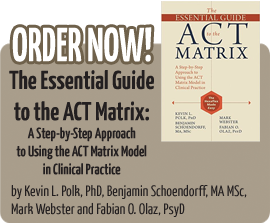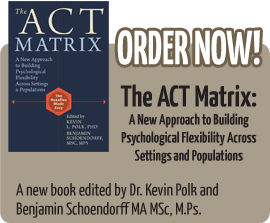After having a conversation about who’s important, we next draw the groups attention to the stuff that can show up inside of us and sometimes get in the way of moving toward who’s important. As in the example above, I usually say “Fear” and put it on the board. I might also throw in another one like “Doubt.” It depends on the audience. Sometimes I prime the group toward including thoughts like “I can’t” into the mix.
If you were watching me working with this audience you would several times hear me say something like…
“So the image of moving toward your friends shows up, and then fear sometimes shows up and gets in the way.”
or
“So sometimes stuff like doubt shows up and gets in the way of moving toward your family.”
Almost invariably during this “what shows up and sometimes gets in the way conversation” you would hear me say something like…
“Isn’t it amazing how this stuff shows up on the inside of us and sometimes ends up getting in the way of us doing something physical? The physical action is simple, like walking or talking, but this stuff can show up on the inside and it seems to grab us. I know it happens to me all to often.”
Notice that I am including myself in this mix, this Matrix. I too have people that are important to me and I have stuff that shows up on the inside and at times gets in the way of moving toward who’s important.
This is genuinely showing the ACT stance; we are all in the same boat pulling on different oars.
“Showing Up”
In this example you are also seeing me us the ACT-consistent language of “showing up” rather than causal language. For example, I could instead say, “You thought about going out with your friends and that caused you to have fear.” This is mechanistic language saying that thinking of friends invariably leads to fear: Friends -> Fear. This is not a link that we want to be training.
By using language like, “Showing up” we are moving toward contextual languaging. [Yes, currently there is no such word as languaging. However, for contextual conversations in English, adding ‘ing’ to words can help with the contextualizing.] Here’s how contextual languaging might sound…
Me: “So you noticed thinking about your friends, and then you noticed fear showing up. When you think about your friends, do you notice other inside stuff showing up?
Audience member: “Yes, ‘like’ shows up. I like my friends.”
Me: “Cool. You noticed the thought of going out with your friends and both like and fear showed up. ‘Like’ might go over hear.”
I then put (like) next to friends on the board. (see below)
Now we have fear showing up on the away side of the matrix and like showing up on the toward side. We have moved toward contextual languaging and we’re showing it on a diagram.
“Sometimes”
You also might have noticed I use words like “sometimes” a lot. That’s also contextual language. It’s easy for us all to slip into mechanistic speech like, “This shows up and then that [always] happens.” The ‘always’ is in brackets because it’s inferred. We don’t say it out loud, but it’s there. The more accurate is, ” ________ shows up and sometimes _________ shows up along with it.
In brief, life is most often about probabilities (sometimes) and seldom about invariability, so we reflect that in our languaging.
“Noticing”
You might also have noticed that I use the words, “So you were noticing __________ showing up.” That’s noticing language, the “automatic mindfulness” of the Matrix. Using the words notice, noticing and noticed helps us all ‘step back’ and look at things from a bigger ‘Toward and Away’ picture.
In Let’s Build a Matrix 3 we will continue the conversation focusing the behaviors that we all do in the service of moving Away from unwanted internal stuff like fear, doubt and ‘I can’t.”
Make sure to email me if you’re interested in the low cost training.
Kevin L. Polk, Ph.D.
Book: http://www.amazon.com/dp/B004M8S4Z4
Web: http://www.drkevinpolk.com
Blog: http://drkevinpolk.blogspot.com
Free Conference Call Info:
Access code is 496959#
USA +1 559 546 1301
Australia* +61 1300 781 250
Austria +43 (0) 1 265 05 60
Canada +1 559 546 1333
Czech Republic +420 225 989 115
France +33 (0) 1 8014 0690
Germany +49 (0) 355 475 4400
Japan +81 3 5050 5070
Netherlands +31 (0) 20 322 3020
Nigeria +234 1 667 0007
Portugal +351 21005 1184
Romania +40 317 807 040
South Africa +27 87 825 0140
Spain +34 91 119 6730
Switzerland +41 (0) 44 595 9050
United Kingdom +44 (0) 784 843 2915






Leave a Reply